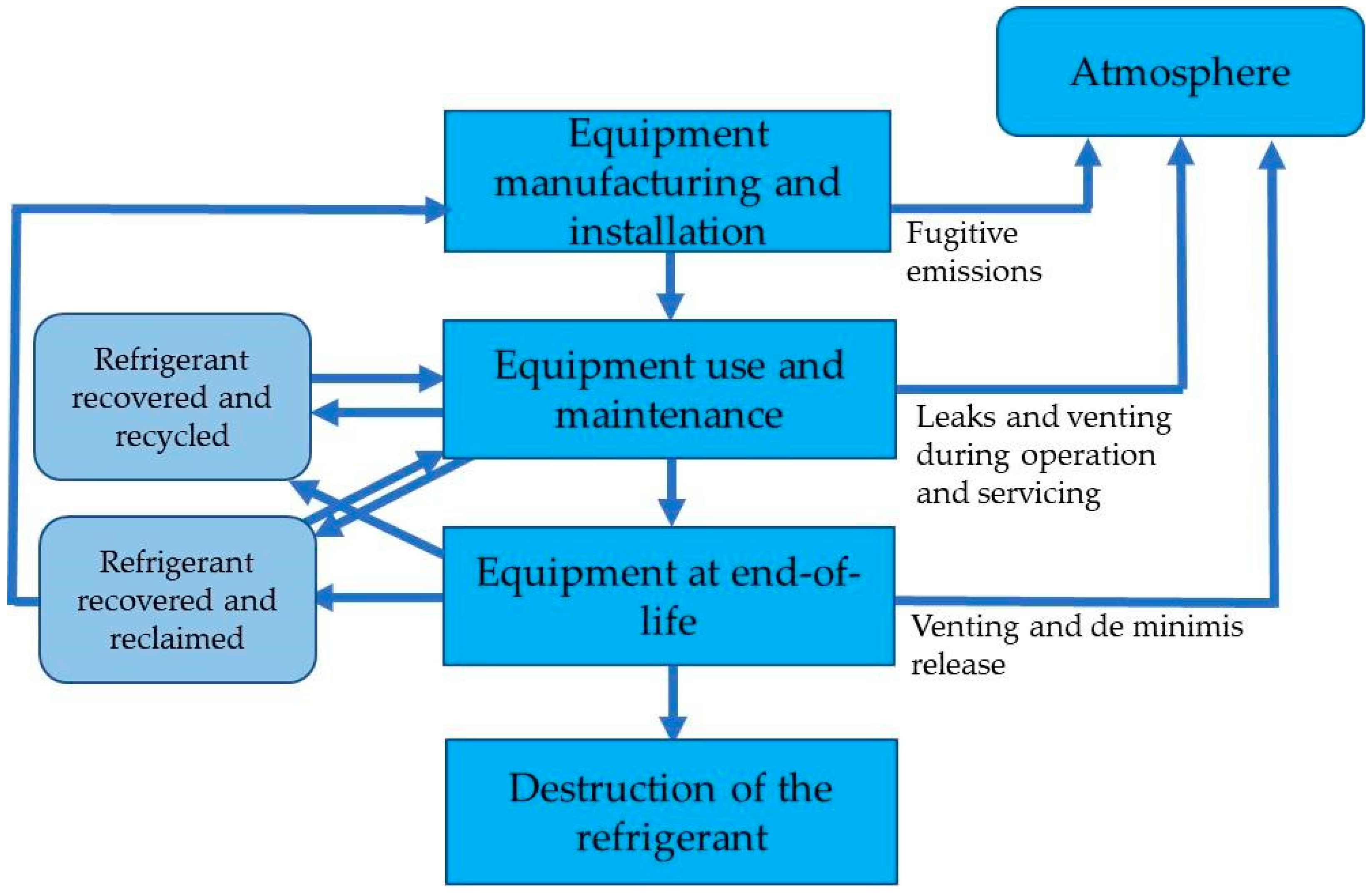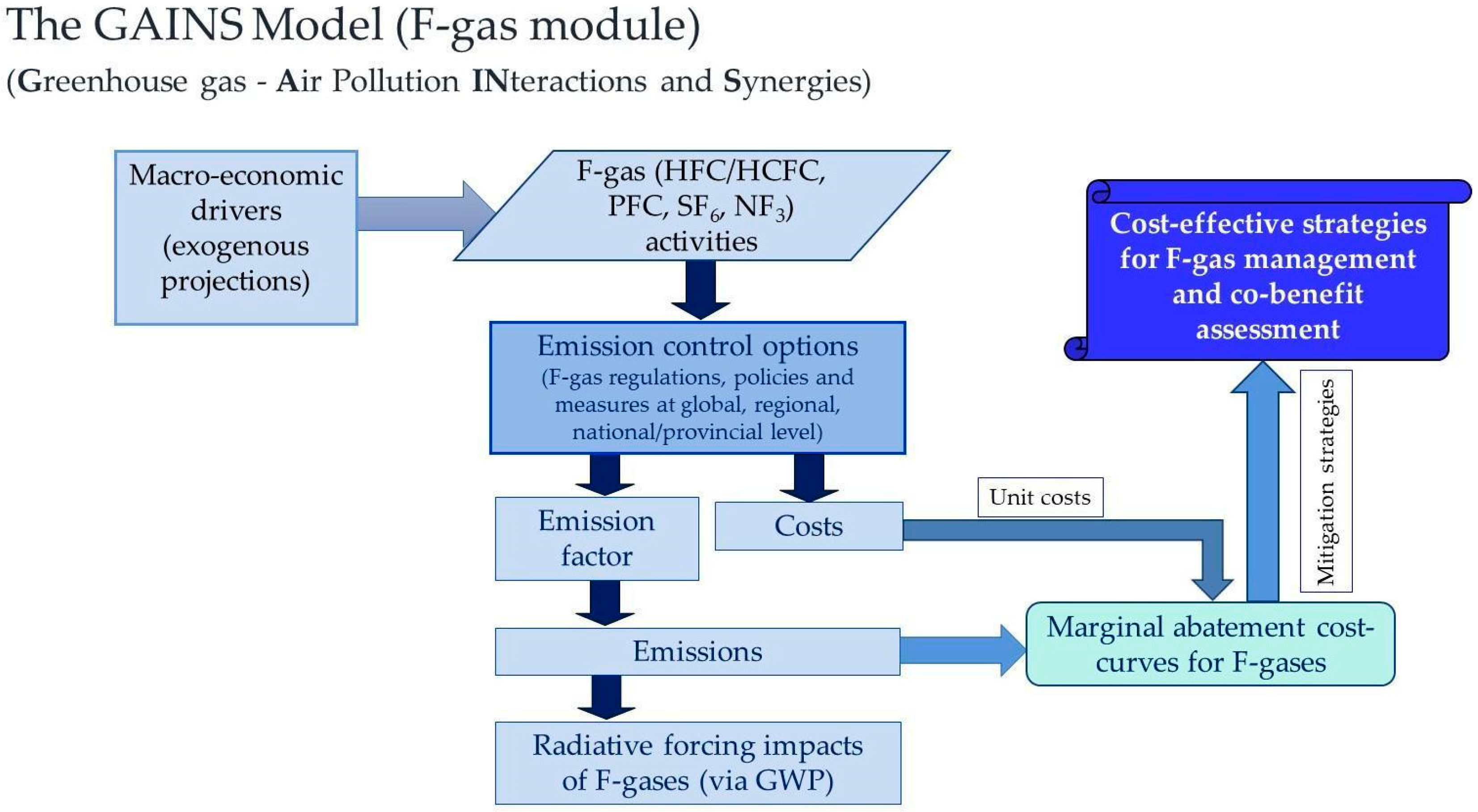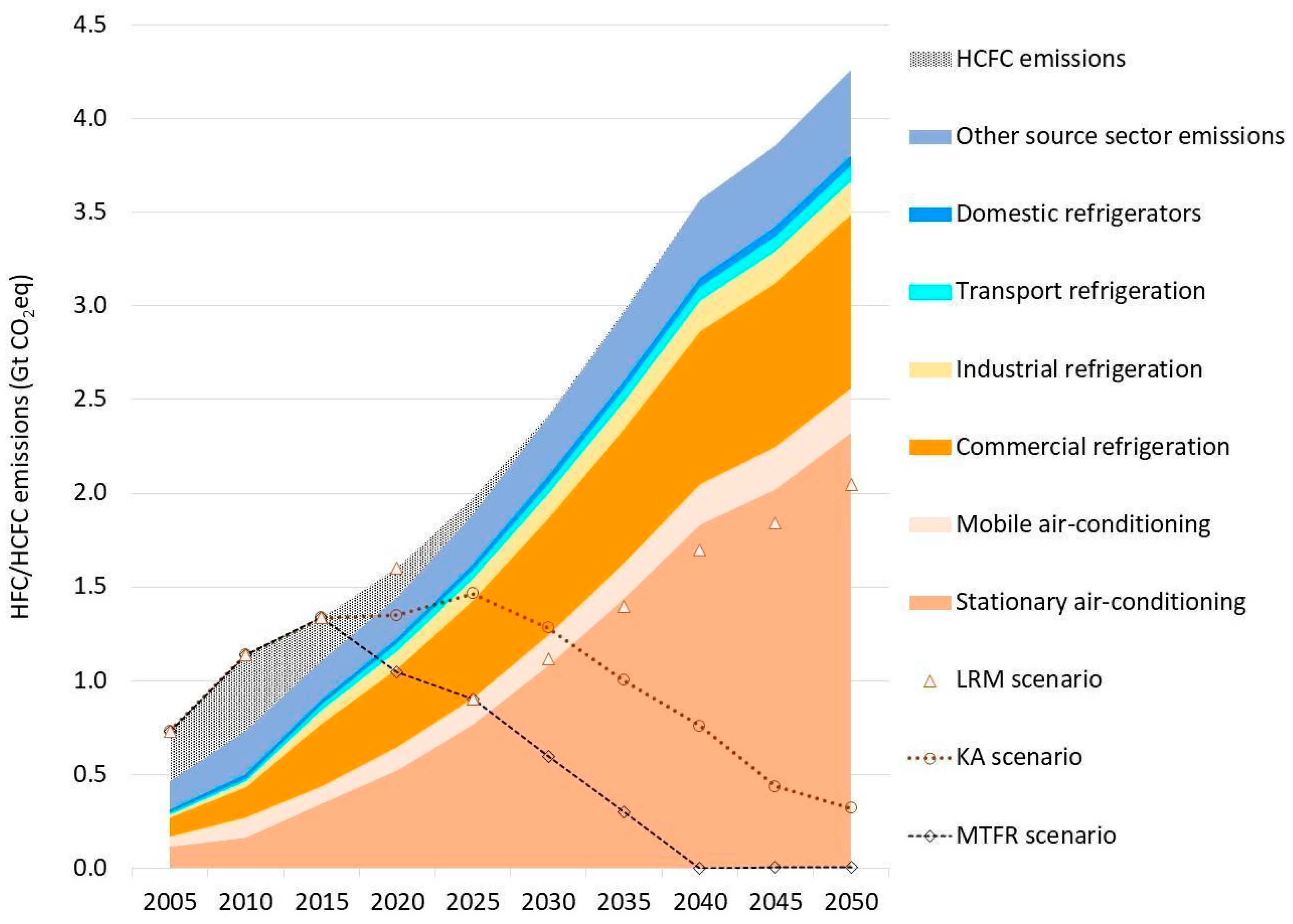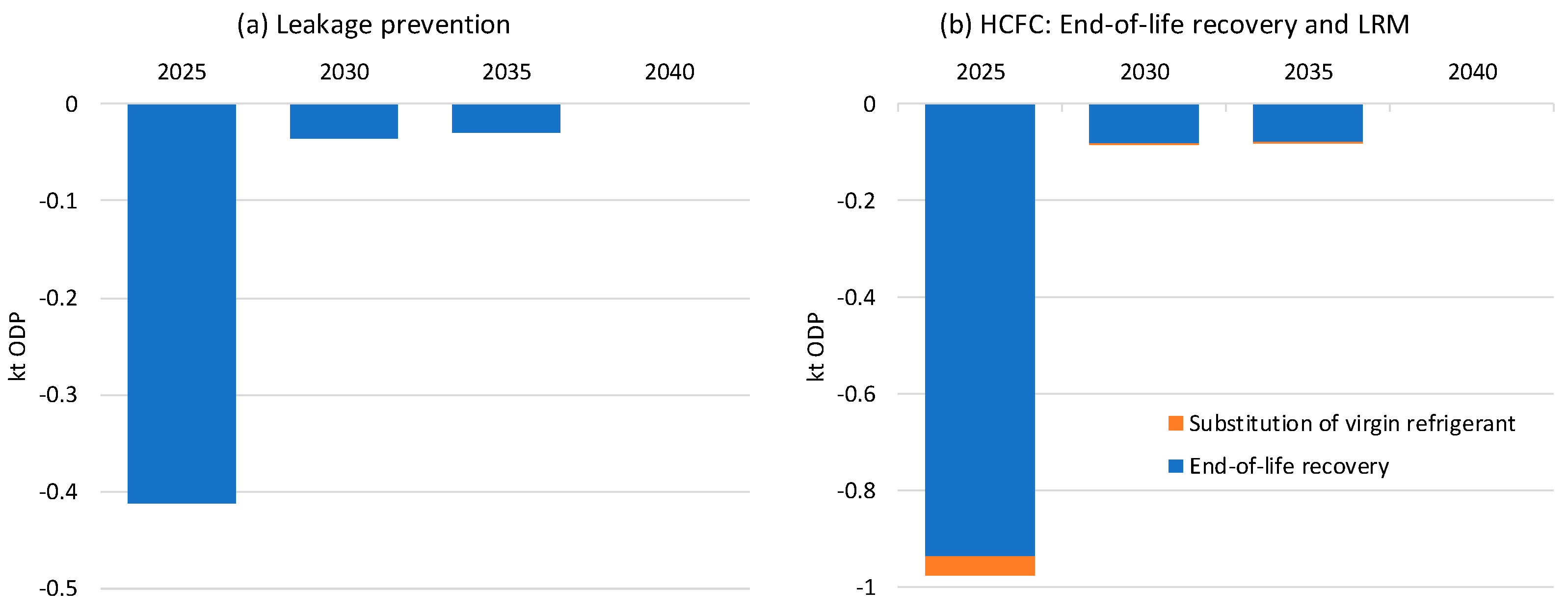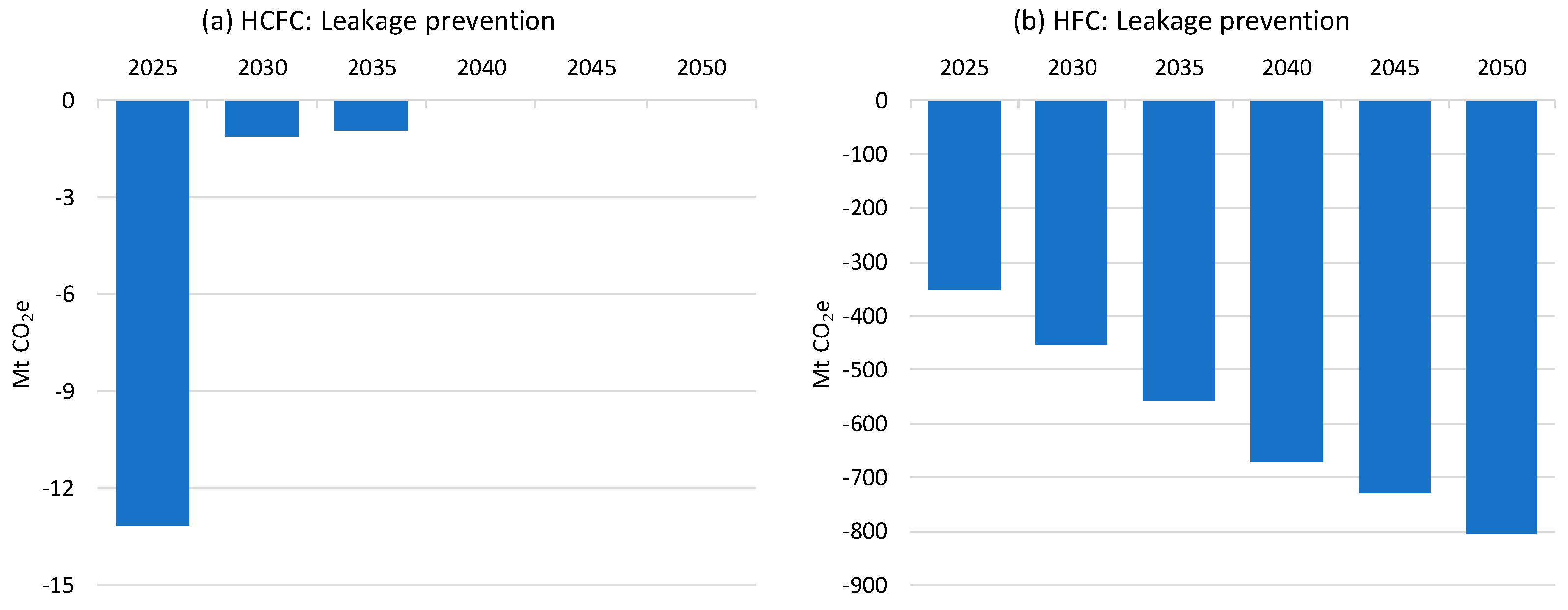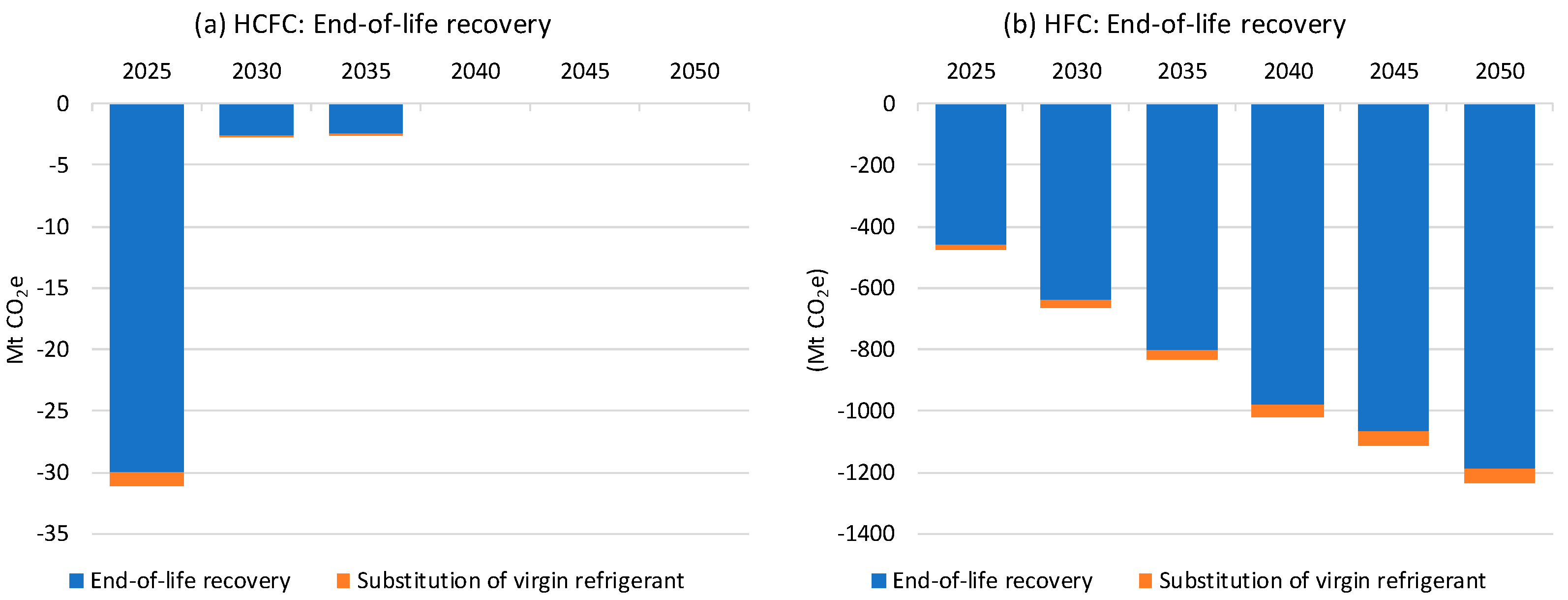Abstract
Hydrofluorocarbons (HFCs) are widely used in refrigeration, air conditioning, heat pumps (RACHP), and various other applications such as aerosols, fire extinguishers, foams, and solvents. Initially, HFCs were adopted as the primary substitutes for ozone-depleting substances (ODSs) regulated under the Montreal Protocol. However, many HFCs are potent greenhouse gases, and as such subject to a global phasedown under the provisions of the Kigali Amendment to the Montreal Protocol. Managing the refrigerant bank of ODSs and HFCs throughout the equipment’s lifecycle—referred to as Lifecycle Refrigerant Management (LRM)—presents a significant challenge but also a significant climate action opportunity. LRM includes the leak prevention, recovery, recycling, reclamation, and destruction (RRRD) of refrigerants. This study employed the GAINS modeling framework to assess the ozone and climate benefits of LRM. The findings indicated that implementing robust LRM practices during the use and end-of-life stages of RACHP equipment could reduce ODS emissions by approximately 5 kt ODP (Ozone Depletion Potential) between 2025 and 2040, and HFC and hydrochlorofluorocarbon (HCFC) emissions by about 39 Gt CO2e between 2025 and 2050. The implementation of robust LRM measures in conjunction with the ongoing phasedown of HFCs under the Kigali Amendment can yield substantial additional climate benefits beyond those anticipated from the HFC phasedown alone.
1. Introduction
Hydrofluorocarbons (HFCs) are currently the most commonly used refrigerant gases in refrigeration, air conditioning, and heat pump (RACHP) systems. Additionally, HFCs are used as solvents in industrial processes, fire-suppression agents, foam-blowing agents, aerosol propellants, and in Metered Dose Inhalers (MDIs) [1,2]. HFC emissions have increased significantly in recent years [3,4,5] primarily in response to the increased demand for cooling services in a warming world [6,7] and the phaseout of ozone-depleting substances (ODSs), such as chlorofluorocarbons (CFCs) and hydrochlorofluorocarbon (HCFCs), under the Montreal Protocol [8,9]. Many HFCs are potent greenhouse gases (GHG) with a global warming potential (GWP) up to 14,600 times that of carbon dioxide (CO2) per mass unit [10] over a 100-year time horizon.
The Montreal Protocol on Substances that Deplete the Ozone Layer has already generated significant climate benefits by phasing out ODS production and consumption [11,12], leading to a partial recovery of the ozone layer [13]. By limiting ODSs, the Protocol and its amendments are projected to reduce the global temperature increase by as much as 2–3 °C [14,15]. The Kigali Amendment (KA) to the Montreal Protocol is an international agreement to gradually reduce the production and consumption of HFCs [16]. If implemented fully, the KA is projected to achieve substantial avoided warming (0.2 to 0.4 °C) by the end of this century [13,16]. However, achieving the goals of the Paris Agreement of limiting warming to 1.5 °C requires even more ambitious measures [17,18], as the current KA commitments are not enough to fully align the fluorocarbon sector with this trajectory [8].
While phasing down/out the production and consumption of fluorocarbons is a crucial step, this alone cannot effectively reduce atmospheric refrigerant emissions. High-GWP refrigerants continue to leak during equipment operation and are released at the end of their lifespan, thereby limiting the overall impact of such measures [19]. ODS banks are decreasing in volume because these chemicals are being emitted at a faster rate than they are being replenished through the acquisition of new equipment. However, the overall size of the global refrigerant bank is increasing significantly due to the rapid proliferation of RACHP equipment that predominantly relies on high-GWP HFCs. While the KA may help slow the growth of high-GWP HFCs in the refrigerant bank, the industry’s gradual transition to lower-GWP refrigerants is unlikely to significantly reduce operational leakage rates and end-of-life (EOL) loss rates. As a result, managing ODS and HFC banks will continue to pose challenges beyond 2050 [20]. Even though the KA makes significant strides in controlling the amount of new high-GWP HFCs entering the global market, much of the forward-looking climate and ozone protection opportunities arise from reducing emissions from the current and future installed bank of HFCs and ozone-depleting substances [21,22].
1.1. Lifecycle Refrigerant Management
Lifecycle Refrigerant Management (LRM) encompasses a set of strategies to reduce refrigerant emissions from equipment, and includes leak reduction, recovery, recycling, reclamation, and destruction, as illustrated in Figure 1 [23,24,25]. Effective LRM strategies minimize the environmental impact of refrigerants by reducing emissions of high-GWP and ODS refrigerants [19]. Additionally, LRM provides a comprehensive approach that benefits the performance and efficiency of RACHP systems [24]. LRM has also emerged as a compelling means of maximizing the climate benefits expected from the KA by preventing lifetime and EOL emissions [21,26,27], and for further accelerating the HFC phasedown under the Montreal Protocol [8,28] by reducing the necessity for new virgin production through fluorocarbon reuse [29].
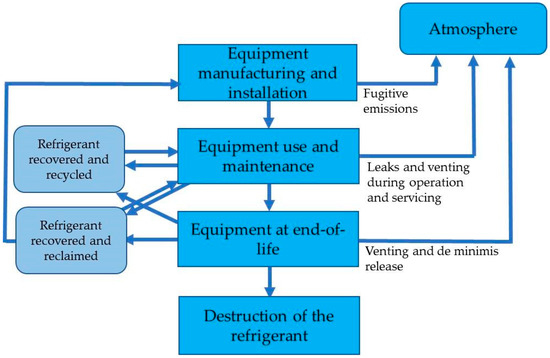
Figure 1.
Flowchart of LRM processes, emissions, and activities. Note: Flowchart does not include GHG emissions from fluorocarbon manufacturing, nor the reclamation or destruction processes.
With the adoption of the KA, the Montreal Protocol has enhanced its climate impact by initiating the gradual reduction of HFC production and consumption to mitigate the climate effect of these potent GHGs. Several parties have already implemented LRM policies and strategies to comply with the Montreal Protocol and Paris Agreement [25,30,31,32,33]. For instance, in Australia, technicians must recover and safely dispose of refrigerants, while importers of bulk refrigerants and pre-charged equipment must participate in a product stewardship program [30]. The U.S.’s Clean Air Act [31] and similar EU regulations [32,33,34] mandate refrigerant recovery, recycling, and reclamation. Japan’s Fluorocarbon Recovery and Destruction Act also covers the entire lifecycle of fluorocarbons [35]. In 2017, Canada issued its Regulations Amending the Ozone-Depleting Substances and Halocarbon Alternatives Regulations (SOR/2020-177), which requires the proper destruction or recovery for recycling and reclamation of HFCs [36]. Similarly, in Norway, regulations concerning the handling of waste refrigerants post-recovery from products and equipment are outlined in the national waste regulation directive, which addresses collection, recycling, destruction, export, and other aspects related to all types of waste [37]. Scaling up and promoting the global adoption of these LRM measures could substantially mitigate both short-term and long-term emissions from the existing refrigerant bank.
1.2. Literature Review—Current Status of LRM
LRM plays a vital role in mitigating ozone depletion by preventing the release of ODSs into the atmosphere. Although the Montreal Protocol has advanced the phaseout of most ODSs, these substances remain in use within legacy equipment worldwide [1]. Leakage from ODS refrigerants, caused by factors such as wear and tear, improper installation, and insufficient maintenance, is a significant source of emissions and ozone layer damage [19,20,21,38]. Regular monitoring and timely repairs are critical to reducing these risks and safeguarding both the ozone layer and the climate. In addition, enhancing the EOL management of ODS-containing products offers an opportunity to further mitigate the environmental impact of remaining ODS banks [21]. Refrigerants recovered from equipment should be either reused—through recycling (removal of impurities from single component refrigerants) or reclamation (removal of impurities and reconstitution of blended refrigerants to virgin specifications)—or destroyed to permanently eliminate their environmental harm. These key practices are central to effective LRM. While reusing refrigerants promotes a circular economy, destruction ensures their permanent removal from the ozone and climate equation [20].
The Montreal Protocol has encouraged the environmentally sound destruction of surplus or contaminated ODSs and HFCs, but has only mandated the destruction of HFC-23 generated as a by-product of HCFC-22 production [12,39], and even then only “as practical”. Mandating the destruction of substances that are not under a phaseout can lead to perverse outcomes; however, it underscores the critical importance of robust leak prevention and recovery practices to prevent their release. Historically, RRRD practices of ODS management have not occurred consistently during operational servicing or at equipment EOL, especially for small residential equipment and in Article 5 parties (primarily developing countries) to the Montreal Protocol.
The annual quantity of ODS-containing equipment and foams reaching end-of-life is estimated to be 250–400 kt (approximately 0.5–0.8 Gt CO2e) between 2020 and 2050 [38], with peak volumes anticipated in the mid-2030s. Additionally, the stockpile of HCFCs and HFCs requiring management is expected to grow until these substances are fully phased out. Small commercial and residential RACHP systems are particularly prone to high EOL refrigerant loss rates. According to Theodoridi et al. [24], 100% of recoverable refrigerants from small RACHP equipment at EOL can be lost if barriers to effective refrigerant recovery are not addressed.
In recent years, LRM has drawn attention as a vital climate solution beyond the ODS phaseout and HFC phasedown efforts [21,24]. New studies support previous assessments that the decline in ODS emissions due to compliance with the Montreal Protocol avoids global warming of approximately 0.5–1.0 °C by mid-century compared to an alternative scenario with an uncontrolled increase in ODSs of 3–3.5% per year [13]. Additional environmental benefits could be achieved by actions under the Montreal Protocol, by managing the emissions of HFCs and/or implementing alternative low-GWP refrigerants. Recent studies anticipate a substantial rise in atmospheric HFC levels in the coming decades, along with rising demand for RACHP equipment and the ongoing HCFC phaseout [4,5,40,41], portending negative repercussions for the global climate [42]. The KA phases down the consumption and production of high-GWP HFCs and constitutes perhaps the single most significant contribution to keeping warming to 1.5 °C to date [16]. Achieving complete adherence to the KA is projected to prevent a temperature rise of 0.3–0.5 °C by 2100 [13]. Notably, this estimation does not account for the impact of HFC-23 emissions.
In 2022, Theodoridi et al. [24] estimated that the implementation of LRM measures could determine the fate of 91 Gt CO2e by 2100, approximately equivalent to three years’ worth of emissions from the global energy sector [24]. In addition to ratifying and implementing the Kigali Amendment, parties can achieve more HFC mitigation through various methods: an accelerated phasedown schedule [8]; collecting and destroying HFCs from EOL equipment [43]; reducing HFC refrigerant leaks through better RACHP equipment design, manufacturing, and servicing; and replacing older inefficient equipment [2]. According to the Global Cooling Watch Report 2023 [44], additional policy measures, surpassing the objectives outlined in the Kigali Amendment, can expedite the phasedown of HFCs by adopting low-GWP technologies in new equipment and improving LRM to minimize leakages and EOL emissions [21,44]. This could potentially halve HFC emissions by 2050 compared to the KA’s schedule [1]. Rapidly transitioning away from high-GWP HFCs, together with improving refrigerant management and collection, and the destruction of HCFCs and HFCs, could avoid emissions in the order of 50 Gt CO2e through 2060 [13,45].
In 2012, approximately 60% of newly produced HFCs were estimated to be used for servicing or “topping up” leaks in RACHP equipment, while the remaining 40% was allocated for filling new equipment [46]. By implementing LRM measures, emissions from the installed refrigerant bank can be significantly reduced [47,48,49], conserving the refrigerants in use and decreasing the demand for virgin production. However, reclaimed refrigerants, when emitted, have the same adverse effects on the ozone layer and climate as virgin refrigerants [21]. Therefore, robust leak management is critical to complement recovery and reclamation efforts. Recovered refrigerants can also be destroyed, permanently preventing their release into the atmosphere. In instances where recycling or reclamation is feasible and there is market demand for reused HFCs, these options are generally more environmentally favorable than destruction. A lifecycle assessment by Yasaka et al. [29] found that reclamation or recycling typically results in lower emissions compared to destruction. However, logistical challenges (e.g., lack of local reclamation facilities), technical issues (e.g., contaminated or complex refrigerant mixtures), or environmental considerations may necessitate destruction in certain cases.
The Technology and Economic Assessment Panel (TEAP) has assessed and analyzed the “banks” of controlled substances in use, in collaboration with the Intergovernmental Panel on Climate Change (IPCC) in 2005 [50], and the Scientific Advisory Panel (SAP) in 2022 [13]. The 2022 Assessment Report of the Medical and Chemical Technical Options Committee (MCTOC) of TEAP [38] documents the ongoing efforts to maintain ODS/HFC bank data and estimates by GIZ Proklima [51], providing valuable insights into past and future opportunities for climate and ozone benefits through LRM. In 2022, the active bank contained around 6 million tons (Mt) of ODSs and HFCs, equivalent to 16 Gt CO2e [38]. This amount represents approximately 30% of global GHG emissions (53.8 Gt CO2eq) in 2022 [52]. Active global ODS banks of the five most common ODSs (CFC-11, CFC-12, HCFC-22, HCFC-141b, and HCFC-142b) amount to 3.2 Mt, equivalent to 9.9 Gt CO2e in 2022 [38]. Moreover, active HFC banks in the RACHP sector, which is the predominant usage of HFCs, are estimated at 2.8 Mt in 2022 and 3.9 Mt by 2030 [38]. While ODS banks have been more concentrated in non-Article 5 parties (developed countries that are not considered Article 5 countries are required to phase out ozone depleting substances more quickly than Article 5 countries), HFC banks are currently more evenly distributed between non-Article 5 and Article 5 (developing countries that consume less than 0.3 kg of controlled substances per capita per year are considered Article 5 countries. These countries are allowed to delay compliance with control measures for ten years to meet their domestic needs) parties, and are expected to become concentrated in Article 5 parties. Banks of ODS refrigerants will diminish to relatively low levels by the early 2030s, including for HCFC-22 [38].
Existing stocks of fluorocarbons, or “banks,” pose a significant long-term climate change risk [19,21]. While extensive research has been conducted on these banks and their emissions [3,4,5,9,13,53,54,55,56,57,58,59,60,61,62], a comprehensive strategy to mitigate delayed emissions remains elusive. For example, Velders et al. [9] simulated the banks and emissions of HFCs from 1990 to 2050, allowing an assessment of the effectiveness of the Kigali Amendment in reducing the climate impact of HFC emissions. Similarly, Purohit et al. [40] developed multiple long-term scenarios (2005–2100) for HFC emissions under various levels of climate policy stringency, also evaluating co-benefits such as electricity savings and reductions in GHG and air pollutant emissions. The long-term consequences of delayed emissions from these existing stocks are a major concern. To significantly enhance climate change mitigation efforts and protect the environment for future generations, a focused approach to mitigating delayed emissions is crucial. In a thorough analysis, Bai et al. [53] proposed a pathway for China to achieve near-zero HFC emissions—both territorial and exported—by 2060. Although their research tackles emissions from banked HFCs [63], further studies are required to explore ODSs and climate benefits associated with the effective management of current and future HCFC and HFC banks at the global level. This study addresses the potential incremental climate and ozone benefits associated with LRM and quantifies the value of LRM as an additional strategy for reducing ODS and HFC emissions.
The structure of this study is as follows: Section 2 outlines the methodology used to evaluate the ozone and climate benefits of LRM. Section 3 presents the results, detailing the ozone benefits in terms of HCFC mitigation potential (expressed in ODP) achieved through leakage prevention, recovery, recycling, and reclamation, as well as the climate benefits in terms of HCFC and HFC mitigation potential (in Gt CO2e). Section 4 discusses additional benefits associated with LRM. Finally, Section 5 provides the conclusion.
2. Materials and Methods
The Greenhouse Gas–Air Pollution Interactions and Synergies (GAINS) model developed by the International Institute for Applied Systems Analysis (IIASA) has previously been used to produce detailed future scenarios for HFC emissions extending to 2100 [3,40,64], which have fed into climate models to assess potential impacts on global warming [10,65,66,67,68,69]. This study employed the GAINS modeling framework to assess the mitigation potential of LRM strategies. A brief description of the GAINS model is provided in the Supplementary Information. For a full explanation of the GAINS model, please refer to ref. [70,71]. Figure 2 illustrates the step-by-step process for modeling F-gas emissions within the GAINS framework [3].
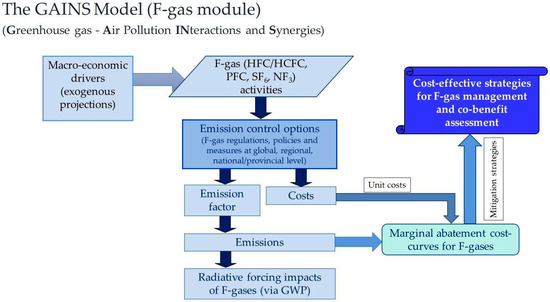
Figure 2.
Modeling F-gas emissions within the GAINS framework.
The analysis begins with current HFC consumption levels, as reported to the United Nations Framework Convention on Climate Change (UNFCCC) or estimated by the GAINS model using a consistent methodology (see ref. [3]). Future HFC demand is then projected based on factors such as population growth, economic development (GDP and sectoral value-added), and climate conditions (cooling degree days), assuming a continuation of HFC use in cooling applications [40]. To the extent that alternative technologies (i.e., low-GWP alternatives) are already adopted due to existing national and regional regulations (i.e., EU F-gas regulations), impacts are reflected in both historical HFC consumption levels and in future baseline scenarios [40,64]. The pre-Kigali baseline scenarios provide a reference point for evaluating the necessity and potential impact of alternative technologies. The mitigation scenarios developed in GAINS maintain equivalent levels of cooling services as their respective baselines but substitute high-GWP HFCs with low-GWP alternatives and adopt LRM measures such as leakage prevention and end-of-life recovery. The selection and sequencing of technology adoption within specific sectors is determined by marginal abatement cost curves [64]. These curves are used to identify the most cost-effective technologies for reducing fluorocarbon emissions and to assess co-benefits [40]. In addition, species-specific emissions data, derived from the GAINS model, are utilized to assess radiative forcing and climate impacts across various scenarios (Figure 2). For comprehensive details regarding sectoral drivers, source-specific emission factors, and implemented control policies, please consult the Supplementary Material of ref. [3].
This study commenced by evaluating the current and future emissions of HCFCs and HFCs, utilizing the GAINS pre-Kigali baseline scenario as a reference point. The GAINS model was then used to project expected emissions with full Kigali Amendment compliance, alongside the implementation of LRM strategies (i.e., leakage prevention and RRRD of refrigerants) in regions with established regulations (i.e., Australia, EU, USA, Japan) prior to the Kigali Amendment’s entry into force. Finally, a “Maximum Technically Feasible Reduction” (MFTR) scenario was developed to investigate the potential for further emission reduction by utilizing all existing best available technologies (BATs), in addition to current regulatory measures including LRM, and a rapid transition to low-GWP refrigerants.
The GAINS model considers “Good Practices” as a control or abatement option that encompasses a comprehensive set of measures: leakage prevention during use and recovery of the refrigerant after EOL of the equipment [3,72]. In refrigerant management, monitoring the effectiveness of leakage prevention and EOL processes is crucial for ensuring that refrigerants are effectively captured and properly managed during both their use and disposal, thereby preventing emissions. In this context, ‘removal efficiency’ of abatement technologies refers to the effectiveness in reducing refrigerant leak rates during the equipment’s operational life, as well as minimizing refrigerant losses during EOL processes. For example, the removal efficiency of leakage prevention during equipment use is estimated at 20 to 50%, meaning that if robust leak prevention practices are adopted, average leak rates can be reduced by 20 to 50%, depending on the type of equipment [72,73,74,75,76]. The removal efficiency of servicing and equipment EOL recovery measures is considered to be higher, ranging from 70% to 90% for RACHP technologies [72,73,77,78], as indicated in Table S1 of the Supplementary Information. This study developed an alternative Lifecycle Refrigerant Management (LRM) scenario to evaluate the technical mitigation potential for ODS and HFC/HCFC emissions from leakage prevention and EOL recovery. This scenario assumes that both Article 5 and non-Article 5 parties will implement good practice LRM measures during the use and EOL phases of RACHP equipment.
In addition, implementing improved LRM practices—specifically the use of recycled and reclaimed refrigerants—could result in approximately 4% further reduction [38] if the recovered (and subsequently recycled or reclaimed) refrigerant displaces new (virgin) refrigerant production and is not simply added to the supply of refrigerant. To evaluate the ozone and climate benefits of LRM, this study explored three key aspects: preventing leakage during equipment operation, ensuring effective refrigerant recovery at the end of the equipment’s life, and replacing the use of virgin refrigerants with reclaimed or recycled alternatives.
3. Results
As detailed in the previous section, the GAINS modeling framework was employed to construct a pre-Kigali baseline and alternative scenarios. This facilitated an assessment of the ozone and climate benefits associated with the implementation of effective LRM measures. Figure 3 presents HFC/HCFC refrigerant emissions in the pre-Kigali baseline and alternative lifecycle refrigerant management (LRM), Kigali Amendment (KA), and Maximum Technically Feasible Reduction (MTFR) scenarios as discussed in Section 2 above. The baseline annual HFC emissions, prior to the KA to the Montreal Protocol, were projected to increase from around 0.5 to 4.3 Gt CO2e between 2005 and 2050 [40]. The estimated 2050 emissions align with the range (4.0–5.3 Gt CO2e) from Velders et al. [4]. It is important to note that current policies have lowered the anticipated 2050 emissions from the initial estimate of 4.0–5.3 Gt CO2e by Velders et al. [4] to a reduced range of 1.9–3.6 Gt CO2e [9].
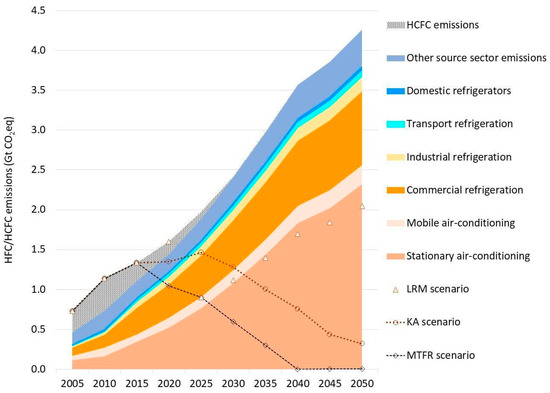
Figure 3.
HFC/HCFC refrigerant emissions in the pre-Kigali baseline (by sector) and alternative lifecycle refrigerant management (LRM), Kigali Amendment (KA), and Maximum Technically Feasible Reduction (MTFR) scenarios.
A full implementation of the Kigali Amendment could achieve a reduction of up to 92% in annual emissions compared to the pre-KA baseline in the mid-term (see Figure 3), while the adoption of existing best available technologies under the MTFR scenario could lower emissions by over 99% relative to the pre-KA baseline by 2050. As shown in Figure 3, the effective implementation of LRM measures could reduce annual HFC/HCFC emissions by 44–48% between 2025 and 2050 under the LRM scenario. The following subsection delineates the ozone and climate benefits derived from effective LRM strategies, contrasting the pre-Kigali baseline and LRM scenarios.
3.1. Ozone Protection Benefits of LRM
LRM can help to reduce ozone depletion by preventing the release of ODSs into the atmosphere. Even though the phaseout of most ODSs under the Montreal Protocol is in the advanced stages, ODS refrigerants are still being used in legacy equipment around the world. In the past, commonly utilized HCFCs included HCFC-22 (mainly as a refrigerant), in cooling applications. Even though new RACHP equipment is now prohibited from using HCFC refrigerants in many parts of the world, the refrigerant banks still contain significant quantities of HCFC-22 because, once installed, RACHP equipment can remain in use for anywhere between 10 and 25 years, depending on the equipment type. Figure 4a presents the ozone benefits in terms of HCFC mitigation using the pre-KA and LRM scenarios, primarily in relation to HCFC-22, due to leakage prevention using the methodology outlined in Section 2 above. Taking an Ozone Depletion Potential (ODP) of 0.055 for HCFC-22 [38], effective leakage prevention is anticipated to yield cumulative reductions in HCFC emissions totaling 1.6 kt ODP from 2025 to 2040 (Figure 4a). Figure S2a in the Supplementary Information details the annual ozone benefits from leakage prevention during this period.
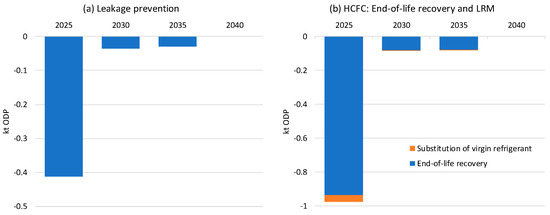
Figure 4.
Ozone benefits in terms of HCFC mitigation (in terms of kt ODP) due to (a) leakage prevention and (b) end-of-life recovery.
Figure 4b presents the ozone benefits in terms of HCFC mitigation due to EOL recovery and the substitution of virgin refrigerant due to reclamation using the GAINS model (see Section 2 above). The effective EOL recovery of refrigerants is anticipated to yield cumulative reductions in HCFC emissions totaling 3.6 kt ODP from 2025 to 2040. Furthermore, implementing improved LRM practices through the displacement of new (virgin) refrigerant could result in a further reduction of approximately 4% [38] if the recovered refrigerant displaces new refrigerant production and is not simply added to the supply of refrigerant. As a result, the technical mitigation potential of RRRD is projected to reach 3.7 kt ODP between 2025 and 2040. Figure S2b in the Supplementary Information details the annual ozone benefits from EOL measures during this period.
3.2. Climate Change Mitigation Benefits of LRM
This section quantifies the potential reduction in global HFC and HCFC emissions achievable through LRM best practices, as illustrated by a comparison of the pre-Kigali and LRM scenarios (see Figure 3). Figure 5 illustrates the climate benefits achieved through the mitigation of HCFC and HFC emissions via leakage prevention using the methodology outlined in Section 2. This assumes the effective implementation of policies, measures, and regulations for leakage prevention by both Article 5 and non-Article 5 parties. Effective leakage prevention considered under the LRM scenario is projected to result in cumulative HFC/HCFC emissions reductions of 15.6 Gt CO2e from 2025 to 2050 relative to the pre-Kigali baseline, as illustrated in Figure 3 above. Figure S3a in the Supplementary Information details the annual HFC/HCFC mitigation from leakage prevention of RACHP equipment during this period.
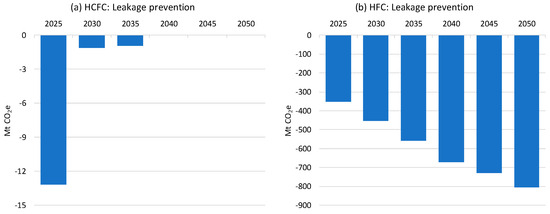
Figure 5.
Climate benefits due to refrigerant leakage prevention: (a) HCFC mitigation and (b) HFC mitigation. (Please note the scale differences).
Applying the methodology detailed in Section 2, Figure 6 depicts the climate advantages arising from HCFC and HFC mitigation through EOL recovery. This assumes the successful implementation of policies, measures, and regulations for leakage prevention by both Article 5 and non-Article 5 parties. From 2025 to 2050, effective LRM practices of refrigerant management at the EOL of RACHP equipment are projected to result in cumulative reductions of approximately 23.4 Gt CO2e in HFC/HCFC emissions relative to a pre-Kigali baseline. Figure S3b in the Supplementary Information details the annual HFC/HCFC mitigation from EOL measures of RACHP equipment during this period.
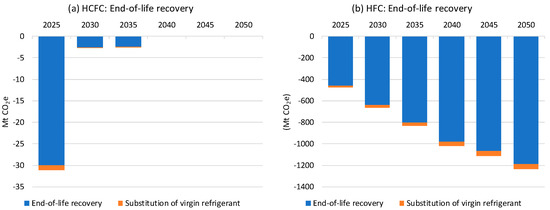
Figure 6.
Climate benefits due to end-of-life recovery: (a) HCFC mitigation and (b) HFC mitigation. (Please note the scale differences).
4. Discussion
This study demonstrates significant potential for climate change mitigation through the effective implementation of LRM strategies within the refrigeration, air conditioning, and heat pump (RACHP) sector. As illustrated in Figure 5 and Figure 6, implementing effective LRM practices during the use phase and EOL of RACHP equipment could reduce HFC and HCFC emissions by approximately 39 Gt CO2e between 2025 and 2050. Notably, EOL measures and the substitution of virgin refrigerants via reclamation account for 60% of this mitigation potential. Several Article 5 countries are currently formulating LRM policies and measures targeting the EOL phase of equipment [21,47,79]. However, addressing leakage prevention is just as essential, as it represents 40% of the overall mitigation potential. Additionally, LRM practices are anticipated to reduce HCFC emissions by about 5 kt ODP between 2025 and 2040, during the ongoing HCFC phaseout under the Montreal Protocol. Our results reveal that implementing LRM measures could reduce annual HFC/HCFC emissions by 44–48% from 2025 to 2050 compared to the pre-Kigali baseline scenario. LRM still provides proportionately the same climate mitigation, even with an effective Kigali Amendment-driven HFC phasedown. Therefore, prioritizing effective LRM is essential to maximize the environmental benefits of the HFC phasedown under the Kigali Amendment to the Montreal Protocol.
Enforcing LRM policies is challenging due to the large number of end-users, distributors, and independent contractors responsible for leak prevention, refrigerant recovery, recycling, and reverse supply chains for destruction and reclamation. Various mandatory and voluntary LRM policies are implemented in many countries, but effective LRM requires strong stakeholder support and adequate capacity, particularly for developing reverse supply chains and training technicians. This support is less available in Article 5 countries. Additional factors to consider in policies and programs include complementary policies related to safety and the safe handling/transportation of refrigerants.
For example, the European Union (EU) has established a comprehensive regulatory framework for managing RACHP equipment, including mandatory inspections, stringent leak detection protocols, and mandatory refrigerant recovery. To address the environmental impacts of refrigerants, the EU has enacted a series of directives including the ODS, F-gas, and WEEE (Waste from Electrical and Electronic Equipment) regulations [33,34,80,81], which collectively cover CFCs, HCFCs, HFCs, and hydrocarbons. The evolving F-gas regulation, now covering HFOs, highlights the EU’s proactive approach to promoting sustainable cooling and heating solutions. Similarly, in the U.S., refrigerant leak reduction has been incentivized through vehicle emissions credits and the Green Chill Program [82,83,84,85,86,87], which partners with the food retail industry to reduce refrigerant emissions. In Australia, Refrigerant Reclaim Australia (RRA) manages a government-backed extended producer responsibility program, legally requiring refrigerant recovery and funded by an industry levy, successfully reducing leak rates [30]. In Article 5 countries such as China, regulations require measures to prevent ODS leaks, with strict fines and mandatory monitoring for non-compliance. Standards have been developed to address refrigerant leakage and refrigerant recovery and recycling from mobile air conditioning (MAC) systems.
Most HFCs and some ODSs are considered short-lived climate pollutants (SLCPs), chemicals with short atmospheric lifetimes and a high GWP. It is now well understood that pairing decarbonization with the additional mitigation of SLCPs can slow the rate of warming a decade or two earlier than decarbonization alone [10,88]. Growth in ODS and HFC banks is fairly “front-loaded” in the next few decades, suggesting that mitigation potential—and possible mitigation of near-term temperature rise—are immediate and critical. According to the MCTOC report [38], it is projected that within the current decade, the predominant banks of ODS and HFCs will emerge from non-Article 5 parties, underscoring the necessity of immediate management strategies. Therefore, there is a pressing need to commence the development of LRM capacities and foster awareness now to address these forthcoming challenges effectively and efficiently.
While RRR practices can prolong the life of existing equipment, they may also result in the continued use of inefficient systems. Additionally, recovered refrigerants may not meet the necessary standards for reuse, creating challenges in recycling and reclamation. Establishing and maintaining LRM infrastructure can be expensive, particularly for smaller organizations and developing countries. Even with preventive measures in place, refrigerant leaks may still occur. Article 5 countries may face difficulties in implementing comprehensive LRM due to limited resources and technological gaps. Furthermore, compatibility issues and inconsistent regulations across regions can complicate the effective implementation of LRM.
5. Additional Benefits of Lifecycle Refrigerant Management
5.1. Energy Efficiency
Refrigerant leakage in cooling equipment typically diminishes its energy efficiency [89,90,91]. While primarily focused on preserving the system’s designed efficiency, addressing leaks in underperforming units can sometimes restore or even enhance their performance [91,92]. Minimizing refrigerant leaks can greatly reduce environmental impacts [93] while also delivering significant energy savings [16,40,94]. This increases the viability of vital cold chains for ensuring supply of food and medication in hot developing countries. For example, DECC [95] observed that a refrigerant charge reduction of just 10%, due to leakage, would lead to an equipment coefficient of performance (COP) reduction of about 3% in heating mode and 15% in cooling operation. A major leak leading to undercharging by 40% would reduce the COP by 45% in heating mode and 24% in cooling operation [95,96]. Kim and Braun [97] estimated that a 25% decrease in refrigerant charge below “full” operating charge can lead to a 16% increase in energy use. Thus, ensuring optimal charge and leak tightness can help significantly reduce both direct and indirect GHG emissions over the lifetime of the equipment. Optimal energy performance also results in environmental and economic benefits due to a reduced cost burden on the consumer for electricity.
Previous TEAP Energy Efficiency (EE) Task Force reports have also shown that combining HFC mitigation with energy efficiency would lead to substantial reductions in cumulative GHG emissions between now and 2050 [1,38], and leaks are a major contributor to low EE, especially in old/locally fitted equipment. Increased energy demand due to refrigerant leaks can, in turn, lead to greater air pollutant emissions from power plants of sulfur dioxide (SO2), nitrogen oxides (NOx), and particulate matter, all of which contribute to adverse health and ecological impacts associated with poor air quality.
5.2. Circular Economy and Sustainability
From a holistic lifecycle emissions perspective, LRM practices, such as the reuse of recycled/reclaimed refrigerants, have a lower carbon footprint compared to the new (virgin) production of fluorocarbons. This is because some GHG emissions associated with the production of new (virgin) fluorocarbons are avoided when existing gases are recovered and reused. Even though there are GHG emissions related to recovery and reclamation, the magnitude of those GHG emissions may be lower compared to virgin production. Three recent studies estimated the lifecycle emissions of F-gas separation technologies and compared those with the lifecycle emissions of virgin F-gas production. Their findings indicate that the overall environmental load (or carbon footprint) for the blending and separation technologies can be between 50% to 99% lower than virgin production [98,99]. Yasaka et al. [29] conducted a lifecycle assessment using actual plant data and found that the GHG emissions associated with recovery and reclamation process were 80% lower than the GHG emissions from the destruction and production of new (virgin) refrigerants. These preliminary results are encouraging, but there is a larger need for full lifecycle assessments to quantify the circular economy benefits of recovery, recycling, and reclamation.
5.3. Additional Benefits Beyond Ozone and Climate Protection
Apart from climate pollution or global warming, refrigerant releases can also contribute, either directly or indirectly, to air pollution. Direct increases in air pollution can occur when certain refrigerants that are classified as volatile organic compounds (VOCs) react with other chemicals in the atmosphere to form harmful pollutants. For example, some non-fluorinated refrigerants (e.g., hydrocarbons), as well as hydrofluoroolefins (HFOs), can react with nitrogen oxides to form ground-level ozone, a major component of photochemical smog [100,101]. While ODS and HFC refrigerants do not have a direct impact on air quality, RACHP equipment operating with sub-optimal refrigerant charge due to leaks results in inefficient operation and increased energy use. Increased energy demand due to refrigerant leaks can, in turn, lead to greater air pollutant emissions from power plants of sulfur dioxide (SO2), nitrogen oxides (NOx), and particulate matter, all of which contribute to adverse health and ecological impacts associated with poor air quality. Thus, LRM plays a supporting role in minimizing direct and indirect air quality impacts.
LRM is a critical component to reduce ecosystem risks and protect the environment from the harmful impacts of refrigerants. There are growing concerns about fluorocarbons that fall under the definition of per- and polyfluoroalkyl substances (PFAS), as defined by the Organization for Economic Cooperation and Development (OECD) in 2021 [102,103]. Even though there is currently a lack of consistent definitions and policies related to PFAS across different geographies [104], LRM can help safeguard ecosystems and human health for future generations by limiting the emissions of those new chemicals.
Managing refrigerants throughout their lifecycle can generate substantial employment opportunities in both non-Article 5 and Article 5 parties. The LRM sector offers diverse job opportunities, including roles such as refrigeration technicians for system installation and maintenance, trained refrigerant reclaimers specializing in recovery and recycling, and refrigerant auditors evaluating and optimizing management practices. As businesses and governments increasingly recognize the importance of managing refrigerants responsibly, the demand for skilled LRM professionals is expected to grow significantly in the coming years. The adoption of lower GWP refrigerants, mandated by the Kigali Amendment, is also creating demand for professionals capable of handling these alternatives safely. For example, the American Innovation and Manufacturing (AIM) Act [87] is projected to create 150,000 U.S. jobs and generate nearly USD 39 billion in economic benefits annually by 2027 [105].
When implemented with incentives or rebates for technicians, LRM can supplement incomes for RACHP technicians. This might be especially valuable in Article 5 parties, in which technician wages are low relative to the value of recovered refrigerant. The success of LRM also relies on the upskilling of technicians across the world, many of whom currently do not possess the skills and/or training to implement LRM best practices. Training and certification, especially if financially sponsored by governments, multilateral agencies, or equipment manufacturers, can provide much-needed workforce development, particularly in Article 5 parties.
6. Conclusions
Lifecycle refrigerant management (LRM) is an important strategy for safeguarding the ozone layer and addressing climate change. By preventing the release of ozone depleting substances (ODS) and hydrofluorocarbons (HFCs), LRM helps control downstream emissions of controlled substances that are currently not covered under the Montreal Protocol. Implementing LRM at scale can also aid compliance with the Montreal Protocol, by increasing volumes of recovered refrigerant that can then be reused. Reusing refrigerant in large enough volumes could ease demand for new (virgin) refrigerant, helping to facilitate the HFC phase down under the Kigali Amendment to the Montreal Protocol. A sufficient supply of recycled and reclaimed refrigerant can provide additional supply, especially for servicing only Article 5 parties. Eventually, environmentally sound destruction of refrigerants will be necessary to permanently avoid emissions and to dispose of refrigerants that cannot be reused. Ultimately, LRM aligns with the core objectives of the Montreal Protocol: protecting the ozone layer and combating climate change.
Effective LRM is projected to reduce Hydrochlorofluorocarbon (HCFC) emissions by 5 kt ODP between 2025 and 2040. This reduction is expected to be achieved through effective leak prevention (1.6 kt ODP) and end-of-life recovery and reclamation (3.7 kt ODP). The cumulative climate mitigation potential of HFC/HCFC emissions from 2025 to 2050 of effective LRM is projected to be 39 Gt CO2e, with 15.6 Gt CO2e through leak prevention, and 23.4 Gt CO2e through RRRD. To achieve these benefits, governments and businesses must prioritize leak prevention and implement RRRD strategies.
The distribution of refrigerant banks and availability trends at the end of their lifespan, especially for HFCs, is shifting from being concentrated in non-Article 5 parties toward a roughly even split between non-Article 5 and Article 5 parties by 2030. After 2030, Article 5 parties will be the primary source of banks and opportunities for LRM in the future. Therefore, Article 5 parties face an urgent need to prioritize the implementation of comprehensive LRM to maximize the potential climate benefits. Likewise, it is crucial to ensure that Article 5 parties maintain a focus on effective LRM, to maximize the long-term climate benefits. Meanwhile, global cooperation and strong national policies are essential to effectively manage ODS and HFC banks.
Supplementary Materials
The following supporting information can be downloaded at: https://www.mdpi.com/article/10.3390/su17010053/s1, Figure S1: The GAINS modeling framework; Figure S2: Ozone benefits from HCFC mitigation (kt ODP) due to: (a) leakage prevention, and (b) end-of-life recovery; Figure S3: HFC/HCFC mitigation (Mt CO2e) due to: (a) leakage prevention, and (b) end-of-life recovery; Table S1: Emission removal efficiencies of leakage prevention and EoL recovery of the cooling technologies.
Author Contributions
Conceptualization, P.P.; methodology, P.P.; formal analysis, P.P., T.C., R.C., R.K. and H.W.-T.; investigation, P.P., T.C. and R.K.; data curation, P.P.; writing—original draft preparation, P.P.; writing—review and editing, PP., A.W., T.C., H.D., R.C., R.K. and R.P.; visualization, P.P. and T.C. All authors have read and agreed to the published version of the manuscript.
Funding
This research received no external funding.
Institutional Review Board Statement
Not applicable.
Informed Consent Statement
Not applicable.
Data Availability Statement
The data used in this study will be made available on request.
Acknowledgments
The authors gratefully acknowledge the support of the Technology and Economic Assessment Panel (TEAP), United Nations Environment Programme. However, the views expressed in this article are solely those of the authors and do not necessarily reflect the official position of the TEAP. The authors express their sincere gratitude to the three anonymous reviewers for their insightful comments, which have substantially enhanced the quality of this manuscript.
Conflicts of Interest
The co-author, Rick Cooke, works for Man-West Environmental Group Ltd., which provides consulting in chemical waste management. The co-author Hilde Dhont is an employee of Daikin Europe, which recovers and uses reclaimed refrigerant. The co-author Helen Walter-Terrinoni is an employee of Trane Technologies, which recovers and uses reclaimed refrigerant. The remaining authors declare that the research was conducted in the absence of any commercial or financial relationships that could be construed as a potential conflict of interest.
References
- UNEP. 2022 Assessment Report of the Refrigeration Technical Options Committee (RTOC). In Technology and Economic Assessment Panel; United Nations Environment Program (UNEP), Ozone Secretariat: Nairobi, Kenya, 2023. [Google Scholar]
- WMO. Scientific Assessment of Ozone Depletion: 2018; Global Ozone Research and Monitoring Project—Report No. 58; World Meteorological Organization (WMO): Geneva, Switzerland, 2019. [Google Scholar]
- Purohit, P.; Höglund-Isaksson, L. Global emissions of fluorinated greenhouse gases 2005–2050 with abatement potentials and costs. Atmos. Chem. Phys. 2017, 17, 2795–2816. [Google Scholar] [CrossRef]
- Velders, G.J.M.; Fahey, D.W.; Daniel, J.S.; Andersen, S.O.; McFarland, M. Future atmospheric abundances and climate forcings from scenarios of global and regional hydrofluorocarbon (HFC) emissions. Atmos. Environ. 2015, 123, 200–209. [Google Scholar] [CrossRef]
- Gschrey, B.; Schwarz, W.; Elsner, C.; Engelhardt, R. High increase of global F-gas emissions until 2050. Greenh. Gas Meas. Manag. 2011, 1, 85–92. [Google Scholar] [CrossRef]
- Khosla, R.; Miranda, N.D.; Trotter, P.A.; Mazzone, A.; Renaldi, R.; McElroy, C.; Cohen, F.; Jani, A.; Perera-Salazar, R.; McCulloch, M. Cooling for sustainable development. Nat. Sustain. 2021, 4, 201–208. [Google Scholar] [CrossRef]
- Grocholski, B. Cooling in a warming world. Science 2020, 370, 776–777. [Google Scholar] [CrossRef]
- Purohit, P.; Borgford-Parnell, N.; Klimont, Z.; Höglund-Isaksson, L. Achieving Paris climate goals calls for increasing ambition of the Kigali Amendment. Nat. Clim. Chang. 2022, 12, 339–342. [Google Scholar] [CrossRef]
- Velders, G.J.M.; Daniel, J.S.; Montzka, S.A.; Vimont, I.; Rigby, M.; Krummel, P.B.; Muhle, J.; O’Doherty, S.; Prinn, R.G.; Weiss, R.F.; et al. Projections of hydrofluorocarbon (HFC) emissions and the resulting global warming based on recent trends in observed abundances and current policies. Atmos. Chem. Phys. 2022, 22, 6087–6101. [Google Scholar] [CrossRef]
- IPCC. Climate Change 2021: The Physical Science Basis. Working Group I Contribution to the Fifth Assessment Report of the Intergovernmental Panel on Climate Change (IPCC); Cambridge University Press: Cambridge, UK; New York, NY, USA, 2021. [Google Scholar]
- Velders, G.J.M.; Andersen, S.O.; Daniel, J.S.; McFarland, M. The importance of the Montreal Protocol in protecting climate. Proc. Natl. Acad. Sci. USA 2007, 104, 4814–4819. [Google Scholar] [CrossRef]
- Andersen, S.O.; Gao, S.; Carvalho, S.; Zaelke, D. Narrowing feedstock exemptions under the Montreal Protocol has multiple environmental benefits. Proc. Natl. Acad. Sci. USA 2021, 118, e2022668118. [Google Scholar] [CrossRef]
- WMO. Scientific Assessment of Ozone Depletion: 2022; Ozone Research and Monitoring—GAW Report No. 278; World Meteorological Organization (WMO): Geneva, Switzerland, 2022. [Google Scholar]
- Young, P.J.; Harper, A.B.; Huntingford, C.; Paul, N.D.; Morgenstern, O.; Newman, P.A.; Oman, L.D.; Madronich, S.; Garcia, R.R. The Montreal Protocol protects the terrestrial carbon sink. Nature 2021, 596, 384–388. [Google Scholar] [CrossRef] [PubMed]
- Velders, G.J.M.; Ravishankara, A.R.; Miller, M.K.; Molina, M.J.; Alcamo, J.; Daniel, J.S.; Fahey, D.W.; Montzka, S.A.; Reimann, S. Preserving Montreal Protocol Climate Benefits by Limiting HFCs. Science 2012, 335, 922–923. [Google Scholar] [CrossRef] [PubMed]
- UNEP. Cooling Emissions and Policy Synthesis Report: Benefits of Cooling Efficiency and the Kigali Amendment; United Nations Environment Programme (UNEP): Nairobi, Kenya; International Energy Agency (IEA): Paris, France, 2020. [Google Scholar]
- UNEP. Emissions Gap Report 2024: No More Hot Air … Please! With a Massive Gap Between Rhetoric and Reality, Countries Draft New Climate Commitments; United Nations Environment Programme: Nairobi, Kenya, 2024. [Google Scholar] [CrossRef]
- Matthews, H.D.; Wynes, S. Current global efforts are insufficient to limit warming to 1.5 °C. Science 2022, 376, 1404–1409. [Google Scholar] [CrossRef] [PubMed]
- CCAC. Resource Book for Life Cycle Management of Fluorocarbons: Good Practice Portfolio for Policy Makers; Climate and Clean Air Coalition (CCAC): Paris, France, 2022. [Google Scholar]
- COPA. ODS/HFC Reclamation and Destruction Technologies: A Review for Article 5 Countries; Climate and Ozone Protection Alliance (COPA): Nairobi, Kenya, 2023. [Google Scholar]
- UNEP. Decision XXXV/11 Task Force Report on Life Cycle Refrigerant Management; Report of the Technology and Economic Assessment Panel (TEAP); United Nations Environment Programme (UNEP): Nairobi, Kenya, 2024; Volume 3. [Google Scholar]
- COPA. Potential Policy Framework for the Promotion of Sustainable ODS/HFC Banks Management; Climate and Ozone Protection Alliance (COPA): Nairobi, Kenya, 2023. [Google Scholar]
- Hillbrand, A.; Madan, P.; Singh, M.; McNamara, M.; Andersen, S.O.; Mathur, A.; Shende, R.; Jaiswal, A. Scenarios for future Indian HFC demand compared to the Kigali Amendment. Environ. Res. Lett. 2022, 17, 074019. [Google Scholar] [CrossRef]
- Theodoridi, C.; Hillbrand, A.; Starr, C.; Mahapatra, A.; Taddonio, K. The 90-Billion-Ton Opportunity: How Minimizing Leaks and Maximizing Reclaim Can Avoid Up to 91 Billion Tons of CO2-Equivalent Emissions; Environmental Investigation Agency (EIA): Washington, DC, USA, 2022. [Google Scholar]
- Ohm, T.; Myung, S.; Jang, W.; Yu, S. A comparison of refrigerant management policies and suggestions for improvement in South Korea. J. Mater. Cycles Waste Manag. 2017, 19, 631–644. [Google Scholar] [CrossRef]
- Chao, T.; Phillips, E.; Mayhew, C.; Crott, S. What Are the Environmental Benefits of Refrigerant Reclamation? Yale Carbon Containment Lab: New Haven, CT, USA, 2024. [Google Scholar]
- Garg, A.; Kumar, S.; Bhasin, S. Current Status and Barriers to Lifecycle Refrigerant Management in India; Council on Energy, Environment and Water: New Delhi, India, 2023. [Google Scholar]
- Kim, J.W.; Kim, S. International Agreements and Global Initiatives for Low-Carbon Cooling; ADBI Working Paper No. 1343; Asian Development Bank Institute: Tokyo, Japan, 2022. [Google Scholar]
- Yasaka, Y.; Karkour, S.; Shobatake, K.; Itsubo, N.; Yakushiji, F. Life-cycle assessment of refrigerants for air conditioners considering reclamation and destruction. Sustainability 2023, 15, 473. [Google Scholar] [CrossRef]
- RRA. Fugitive Emissions: The Case for Improving Refrigerant Recovery from Split Systems at End-of-Life; Refrigerant Reclaim Australia (RRA): Braddon, ACT, Australia, 2020; Available online: https://refrigerantreclaim.com.au/wp-content/uploads/2021/08/RRA-Domestic-AC-Refigerant-Recovery-Project.pdf (accessed on 23 March 2024).
- U.S. EPA. Draft Report—Analysis of the U.S. Hydrofluorocarbon Reclamation Market: Stakeholders, Drivers, and Practices; Stratospheric Protection Division, Office of Atmospheric Programs, U.S. Environmental Protection Agency (U.S. EPA): Washington, DC, USA, 2022.
- EU. Regulation (EU) 2024/590 of the European Parliament and of the Council of 7 February 2024 on Substances That Deplete the Ozone Layer, and Repealing Regulation (EC) No 1005/2009; Official Journal of the European Union: Luxembourg, 2024; Available online: https://eur-lex.europa.eu/legal-content/EN/TXT/PDF/?uri=CELEX:32024R0590 (accessed on 17 August 2024).
- EU. Regulation (EU) No 517/2014 of the European Parliament and of the Council of 16 April 2014 on Fluorinated Greenhouse Gases and Repealing Regulation (EC) No 842/2006; Official Journal of the European Union: Luxembourg, 2006; Available online: https://eur-lex.europa.eu/legal-content/EN/TXT/PDF/?uri=CELEX:32014R0517 (accessed on 17 November 2024).
- EU. Regulation (EC) No 842/2006 of the European Parliament and of the Council of 17 May 2006 on Certain Fluorinated Greenhouse Gases; Official Journal of the European Union: Luxembourg, 2006; Available online: https://eur-lex.europa.eu/legal-content/EN/TXT/PDF/?uri=CELEX:32006R0842 (accessed on 17 November 2024).
- MoE. Act on Rational Use and Proper Management of Fluorocarbons; Ministry of Environment (MoE), Goverment of Japan: Tokyo, Japan, 2016. Available online: https://www.env.go.jp/content/900451359.pdf (accessed on 21 July 2024).
- Government of Canada. Regulations Amending the Ozone-depleting Substances and Halocarbon Alternatives Regulations: SOR/2020–177, Part II; Canada Gazette: Ottawa, ON, Canada, 2020; Volume 154.
- Torgrim, A.; Gaustad, A.; Solgaard, L.; Danielsen, A.; Riksfjord, K.; Sørensen, G.; Steien, A.; Vandenbroucque, T. Activating Circular Economy for Sustainable Cooling: Legislation and Practices for End-of-Life Management of Refrigerants and Other F-Gases in Norway and the EU; Norwegian Environmental Agency: Oslo, Norway, 2023.
- UNEP. 2022 Assessment Report of the Medical and Chemical Technical Options Committee. In Technology and Economic Assessment Panel; United Nations Environment Program (UNEP), Ozone Secretariat: Nairobi, Kenya, 2022. [Google Scholar]
- Stanley, K.M.; Say, D.; Mühle, J.; Harth, C.M.; Krummel, P.B.; Young, D.; O’Doherty, S.J.; Salameh, P.K.; Simmonds, P.G.; Weiss, R.F.; et al. Increase in global emissions of HFC-23 despite near-total expected reductions. Nat. Commun. 2020, 11, 397. [Google Scholar] [CrossRef]
- Purohit, P.; Höglund-Isaksson, L.; Dulac, J.; Shah, N.; Wei, M.; Rafaj, P.; Schöpp, W. Electricity savings and greenhouse gas emission reductions from global phase-down of hydrofluorocarbons. Atmos. Chem. Phys. 2020, 20, 11305–11327. [Google Scholar] [CrossRef]
- Velders, G.J.M.; Fahey, D.W.; Daniel, J.S.; McFarland, M.; Andersen, S.O. The large contribution of projected HFC emissions to future climate forcing. Proc. Natl. Acad. Sci. USA 2009, 106, 10949–10954. [Google Scholar] [CrossRef] [PubMed]
- Hurwitz, M.M.; Fleming, E.L.; Newman, P.A.; Li, F.; Mlawer, E.; Cady-Pereira, K.; Bailey, R. Ozone depletion by hydrofluorocarbons. Geophys. Res. Lett. 2015, 42, 8686–8692. [Google Scholar] [CrossRef]
- Castro, P.J.; Aráujo, J.M.M.; Martinho, G.; Pereiro, A.B. Waste management strategies to mitigate the effects of fluorinated greenhouse gases on climate change. Appl. Sci. 2021, 11, 4367. [Google Scholar] [CrossRef]
- UNEP. Global Cooling Watch 2023: Keeping it Chill: How to Meet Cooling Demands While Cutting Emissions; United Nations Environment Programme (UNEP): Nairobi, Kenya, 2023. [Google Scholar]
- Sun, X.; Wang, P.; Ferris, T.; Lin, H.; Dreyfus, G.; Gu, B.H.; Zaelke, D.; Wang, Y. Fast action on short-lived climate pollutants and nature-based solutions to help countries meet carbon neutrality goals. Adv. Clim. Chang. Res. 2022, 13, 564–577. [Google Scholar] [CrossRef]
- UNEP. Overview of HFC Market Sectors. In Proceedings of the UNEP Ozone Secretariat Workshop on HFC Management: Technical Issues, Bangkok, Thailand, 20–21 April 2015. [Google Scholar]
- Kumar, S.; Garg, A.; Bhasin, S.; Bhambure, J.; Asphjell, T. Activating Circular Economy for Sustainable Cooling: How Can India Effectively Manage the Lifecycle of Refrigerants? Council on Energy, Environment and Water: New Delhi, India, 2023. [Google Scholar]
- Sovacool, B.K.; Griffiths, S.; Kim, J.; Bazilian, M.D. Climate change and industrial F-gases: A critical and systematic review of developments, sociotechnical systems and policy options for reducing synthetic greenhouse gas emissions. Renew. Sustain. Energy Rev. 2021, 141, 110759. [Google Scholar] [CrossRef]
- Duan, H.; Miller, T.R.; Liu, G.; Zeng, X.; Yu, K.; Huang, Q.; Zuo, J.; Qin, Y.; Li, J. Chilling Prospect: Climate Change Effects of Mismanaged Refrigerants in China. Environ. Sci. Technol. 2018, 52, 6350–6356. [Google Scholar] [CrossRef] [PubMed]
- IPCC-TEAP. IPCC/TEAP Special Report on Safeguarding the Ozone Layer and the Global Climate System: Issues Related to Hydrofluorocarbons and Perfluorocarbons; Intergovernmental Panel on Climate Change (IPCC) and Technology and Economic Assessment Panel (TEAP), Cambridge University Press: Cambridge, UK; New York, NY, USA, 2005. [Google Scholar]
- GIZ. Global Banks of Ozone Depleting Substances—A Country—Level Estimate; German International Cooperation Society (GIZ): Eschborn, Germany, 2018. [Google Scholar]
- Crippa, M.; Guizzardi, D.; Pagani, F.; Banja, M.; Muntean, M.; Schaaf, E.; Becker, W.; Monforti-Ferrario, F.; Quadrelli, R.; Risquez Martin, A.; et al. GHG Emissions of All World Countries; Publications Office of the European Union: Luxembourg, 2023. [Google Scholar] [CrossRef]
- Bai, F.; An, M.; Wu, J.; Fang, X.; Jiang, P.; Yao, B.; Zhao, X.; Xiang, X.; Chen, Z.; Hu, H. Pathway and Cost-Benefit Analysis to Achieve China’s Zero Hydrofluorocarbon Emissions. Environ. Sci. Technol. 2023, 57, 6474–6484. [Google Scholar] [CrossRef] [PubMed]
- Wang, X.; Purohit, P. Transitioning to low-GWP alternatives with enhanced energy efficiency in cooling non-residential buildings of China. Mitig. Adapt. Strateg. Glob. Chang. 2022, 27, 45. [Google Scholar] [CrossRef]
- Flerlage, H.; Velders, G.J.M.; Boer, J.D. A review of bottom-up and top-down emission estimates of hydrofluorocarbons (HFCs) in different parts of the world. Chemosphere 2021, 6, 131208. [Google Scholar] [CrossRef]
- Lickley, M.; Solomon, S.; Fletcher, S.; Fletcher, S.; Velders, G.J.M.; Daniel, J.; Rigby, M.; Montzka, S.A.; Kuijpers, L.J.M.; Stone, K. Quantifying contributions of chlorofluorocarbon banks to emissions and impacts on the ozone layer and climate. Nat. Commun. 2020, 11, 1380. [Google Scholar] [CrossRef] [PubMed]
- Wang, X.; Purohit, P.; Höglund Isaksson, L.; Zhang, S.; Fang, H. Co-benefits of energy-efficient air conditioners in the residential building sector of China. Environ. Sci. Technol. 2020, 54, 13217–13227. [Google Scholar] [CrossRef] [PubMed]
- Fang, X.; Ravishankara, A.R.; Velders, G.J.M.; Molina, M.J.; Su, S.; Zhang, J.; Hu, J.; Prinn, R.G. Changes in emissions of ozone-depleting substances from China due to implementation of the Montreal Protocol. Environ. Sci. Technol. 2018, 52, 11359–11366. [Google Scholar] [CrossRef]
- Simmonds, P.G.; Rigby, M.; McCulloch, A.; O’Doherty, S.; Young, D.; Mühle, J.; Krummel, P.B.; Steele, P.; Fraser, P.J.; Manning, A.J.; et al. Changing trends and emissions of hydrochlorofluorocarbons (HCFCs) and their hydrofluorocarbon (HFCs) replacements. Atmos. Chem. Phys. 2017, 17, 4641–4655. [Google Scholar] [CrossRef]
- Sharma, M.; Chaturvedi, V.; Purohit, P. Long-term carbon dioxide and hydrofluorocarbon emissions from commercial space cooling and refrigeration in India: A detailed analysis within an integrated assessment modelling framework. Clim. Chang. 2017, 143, 503–517. [Google Scholar] [CrossRef]
- Montzka, S.A.; McFarland, M.; Andersen, S.O.; Miller, B.R.; Fahey, D.W.; Hall, B.D.; Hu, L.; Siso, C.; Elkins, J.W. Recent Trends in Global Emissions of Hydrochlorofluorocarbons and Hydrofluorocarbons: Reflecting on the 2007 Adjustments to the Montreal Protocol. J. Phys. Chem. A 2015, 119, 4439–4449. [Google Scholar] [CrossRef]
- Rigby, M.; Prinn, R.G.; O’Doherty, S.; Miller, B.R.; Ivy, D.; Mühle, J.; Harth, C.M.; Salameh, P.K.; Arnold, T.; Weiss, R.F.; et al. Recent and future trends in synthetic greenhouse gas radiative forcing. Geophys. Res. Lett. 2014, 41, 2623–2630. [Google Scholar] [CrossRef]
- Liu, H.; Duan, H.; Zhang, N.; Ma, Y.; Liu, G.; Miller, T.R.; Mao, R.; Xu, M.; Li, J.; Yang, J. Rethinking time-lagged emissions and abatement potential of fluorocarbons in the post-Kigali Amendment era. Nat. Commun. 2024, 15, 6687. [Google Scholar] [CrossRef]
- Höglund-Isaksson, L.; Purohit, P.; Amann, M.; Bertok, I.; Rafaj, P.; Schöpp, W.; Borken-Kleefeld, J. Cost estimates of the Kigali Amendment to phase-down hydrofluorocarbons. Environ. Sci. Policy 2017, 75, 138–147. [Google Scholar] [CrossRef]
- Purohit, P.; Höglund-Isaksson, L.; Klimont, Z.; Borgford-Parnell, N. The key role of propane in a sustainable cooling sector. Proc. Natl. Acad. Sci. USA 2022, 119, e2206131119. [Google Scholar] [CrossRef]
- UNEP. Integrated Assessment of Short-Lived Climate Pollutants in Latin America and the Caribbean: Improving Air Quality While Contributing to Climate Change Mitigation; United Nations Environment Program (UNEP) and Climate and Clean Air Coalition (CCAC): Paris, France, 2018. [Google Scholar]
- IPCC. Global Warming of 1.5 °C: An IPCC Special Report on the Impacts of Global Warming of 1.5 °C Above Pre-Industrial Levels and Related Global Greenhouse Gas Emission Pathways, in the Context of Strengthening the Global Response to the Threat of Climate Change, Sustainable Development, and Efforts to Eradicate Poverty; Intergovernmental Panel on Climate Change (IPCC), Cambridge University Press: Cambridge, UK; New York, NY, USA, 2018. [Google Scholar]
- UNEP. The Emissions Gap Report 2017; United Nations Environment Programme (UNEP): Nairobi, Kenya, 2017. [Google Scholar]
- Gambhir, A.; Napp, T.; Hawkes, A.; Höglund-Isaksson, L.; Winiwarter, W.; Purohit, P.; Wagner, F.; Bernie, D.; Lowe, J. The contribution of non-CO2 greenhouse gas mitigation to achieving long-term temperature goals. Energies 2017, 10, 602. [Google Scholar] [CrossRef]
- Amann, M.; Bertok, I.; Borken-Kleefeld, J.; Cofala, J.; Heyes, C.; Höglund-Isaksson, L.; Klimont, Z.; Nguyen, B.; Posch, M.; Rafaj, P.; et al. Cost-effective control of air quality and greenhouse gases in Europe: Modeling and policy applications. Environ. Modell. Softw. 2011, 26, 1489–1501. [Google Scholar] [CrossRef]
- Amann, M.; Kiesewetter, G.; Schoepp, W.; Klimont, Z.; Winiwarter, W.; Cofala, J.; Rafaj, P.; Hoglund-Isaksson, L.; Gomez-Sabriana, A.; Heyes, C.; et al. Reducing global air pollution: The scope for further policy interventions. Philos. Transact. A Math. Phys. Eng. Sci. 2020, 378, 20190331. [Google Scholar] [CrossRef]
- Tohka, A. The GAINS Model for Greenhouse Gases—Version 1.0: HFC, PFC and SF6; International Institute for Applied Systems Analysis (IIASA): Laxenburg, Austria, 2005.
- Novem/Ecofys. Het Broeikaseffect en Het Gebruik van HFK’s, PFK’s en SF6—Een Studie Naar Het Gebruik, de Emissie, Reductiemogelijkheden en Alternatieven; van der Steen, J.J.D., van Brummelen, M., Eds.; Ecofys: Utrecht, The Netherlands, 1997. [Google Scholar]
- Heijnes, H.; van Brummelen, M.; Blok, K. Reduction of the Emissions of HFC’s, PFC’s and SF6 in the European Union; Final Report; Ecofys: Utrecht, The Netherlands, 1999. [Google Scholar]
- Harnisch, J.; Hendriks, C. Economic Evaluation of Emission Reductions of HFCs, PFCs and SF6 in Europe; Ecofys: Utrecht, The Netherlands, 2000. [Google Scholar]
- Harnisch, J.; Schwarz, W. Costs and the Impact on Emissions of Potential Regulatory Framework for Reducing Emissions of Hydrofluorocarbons, Perfluorocarbons and Sulphur Hexafluoride; Ecofys and Oko-Recherche: Utrecht, The Netherlands, 2003. [Google Scholar]
- Schwarz, W.; Gschrey, B.; Leisewitz, A.; Herold, A.; Gores, S.; Papst, I.; Usinger, J.; Oppelt, D.; Croiset, I.; Pedersen, H.; et al. Preparatory Study for a Review of Regulation (EC) No 842/2006 on Certain Fluorinated Greenhouse Gases; Final Report Prepared for the European Commission in the Context of Service Contract No 070307/2009/548866/SER/C4; Official Journal of the European Union: Luxembourg, 2011. [Google Scholar]
- Höglund-Isaksson, L.; Purohit, P.; Gomez-Sanabria, A.; Kaltenegger, K.; Pauls, A.; Rafaj, P.; Sander, R.; Srivastava, P.; Warnecke, L.; Winiwarter, W. Non-CO2 Greenhouse Gas Emissions in the EU-27 from 2005 to 2070 with Mitigation Potentials and Costs: GAINS Model Methodology; International Institute for Applied Systems Analysis (IIASA): Laxenburg, Austria, 2023.
- PRC. Regulations on the Management of Ozone Depleting Substances. Adopted at the 104th Executive Meeting of the State Council on March 24, 2010, Promulgated by Decree No. 573 of the State Council of the People’s Republic of China (PRC) on April 8, 2010, and Effective as of June 1, 2010. Available online: http://en.moj.gov.cn/pdf/RegulationsonAdministrationofOzoneDepletingSubstances.pdf (accessed on 19 November 2024).
- EU. Directive 2008/98/EC of the European Parliament and of the Council of 19 November 2008 on Waste and Repealing Certain Directives; L 312/3; Official Journal of the European Union: Luxembourg, 2008. [Google Scholar]
- EU. Regulation (EU) 2024/573 of the European Parliament and of the Council of 7 February 2024 on Fluorinated Greenhouse Gases, Amending Directive (EU) 2019/1937 and Repealing Regulation (EU) No 517/2014; L Series; Official Journal of the European Union: Luxembourg, 2024. [Google Scholar]
- U.S. EPA. ODS Destruction in the United States and Abroad. 2021. Available online: https://www.epa.gov/system/files/documents/2022-08/April 2021 ODS Destruction in the United States and Abroad Report.pdf (accessed on 12 August 2024).
- U.S. EPA. Background on HFCs and the AIM Act. Available online: https://www.epa.gov/climate-hfcs-reduction/background-hfcs-and-aim-act (accessed on 12 August 2024).
- U.S. EPA. GreenChill Program. Available online: https://www.epa.gov/greenchill (accessed on 12 August 2024).
- U.S. EPA. Motor Vehicle Air Conditioning (MVAC) System Servicing. Available online: https://www.epa.gov/mvac (accessed on 12 August 2024).
- U.S. EPA. Stationary Refrigeration and Air Conditioning. Available online: https://www.epa.gov/section608 (accessed on 12 August 2024).
- U.S. EPA. Management of Certain Hydrofluorocarbons and Substitutes Under Subsection (h) of the American Innovation and Manufacturing Act. Available online: https://www.epa.gov/climate-hfcs-reduction/management-certain-hydrofluorocarbons-and-substitutes-under-subsection-h (accessed on 12 August 2024).
- Dreyfus, G.; Wei, M.; Shah, N.; Taddonio, K. Ambitious Replenishment of the Multilateral Fund for Implementation of the Montreal Protocol Delivers High Impact Climate Benefits at Low Cost; Institute for Governance & Sustainable Development (IGSD) and Lawrence Berkeley National Laboratory (LBNL): Washington, DC, USA; Berkeley, CA, USA, 2023.
- Chua, K.J.; Chou, S.K.; Yang, W.M.; Yan, J. Achieving better energy-efficient air conditioning–a review of technologies and strategies. Appl. Energy 2013, 104, 87–104. [Google Scholar] [CrossRef]
- Kim, J.; Cai, J.; Braun, J.E. Common Faults and Their Prioritization in Small Commercial Buildings: February 2017–December 2017; NREL/SR-5500-70136; National Renewable Energy Laboratory: Golden, CO, USA, 2018. Available online: https://www.nrel.gov/docs/fy18osti/70136.pdf (accessed on 30 November 2024).
- Tassou, S.A.; Grace, I.N. Fault diagnosis and refrigerant leak detection in vapour compression refrigeration systems. Int. J. Refrig. 2005, 28, 680–688. [Google Scholar] [CrossRef]
- Koronaki, I.P.; Cowan, D.; Maidment, G.; Beerman, K.; Schreurs, M.; Kaar, K.; Chaer, I.; Gontarz, G.; Christodoulaki, R.I.; Cazauran, X. Refrigerant emissions and leakage prevention across Europe—Results from the RealSkillsEurope project. Energy 2012, 45, 71–80. [Google Scholar] [CrossRef]
- Calm, J.M. Emissions and environmental impacts from air-conditioning and refrigeration systems. Int. J. Refrig. 2002, 25, 293–305. [Google Scholar] [CrossRef]
- Li, G. Investigations of life cycle climate performance and material life cycle assessment of packaged air conditioners for residential application. Sustain. Energy Technol. Assess. 2015, 11, 114–125. [Google Scholar] [CrossRef]
- DECC. Impacts of Leakage from Refrigerants in Heat Pumps; Department of Energy and Climate Change (DECC): London, UK, 2014.
- Cowan, D.; Gartshore, J.; Chaer, I.; Francis, C.; Maidment, G. REAL Zero—Reducing Refrigerant Emissions & Leakage—Feedback from the IOR Project; Institute of Refrigeration: Carshalton, UK, 2009. Available online: https://www.epa.gov/sites/default/files/documents/IOR_ReducingRefrigerantEmissions.pdf (accessed on 11 September 2024).
- Kim, W.; Braun, J.E. Evaluation of the impacts of refrigerant charge on air conditioner and heat pump performance. Int. J. Refrig. 2012, 35, 1805–1814. [Google Scholar] [CrossRef]
- Mayhew, C.; Chao, T.; O’Rourke, A. Lifecycle Refrigerant Management: Maximizing the Atmospheric and Economic Benefits of the Montreal Protocol; Yale Carbon Containment Lab: New Haven, CT, USA, 2023. [Google Scholar]
- Gonzalez-Olmos, R.; Llovell, F. Life cycle assessment of fluorinated gas recovery from waste refrigerants through vacuum swing adsorption. Sustain. Mater. Technol. 2024, 39, e00811. [Google Scholar] [CrossRef]
- Madronich, S.; Sulzberger, B.; Longstreth, J.D.; Schikowski, T.; Andersen, M.P.S.; Solomon, K.R.; Wilson, S.R. Changes in tropospheric air quality related to the protection of stratospheric ozone in a changing climate. Photochem. Photobiol. Sci. 2023, 22, 1129–1176. [Google Scholar] [CrossRef] [PubMed]
- McGillen, M.R.; Fried, Z.T.P.; Khan, M.A.H.; Kuwata, K.T.; Martin, C.M.; O’Doherty, S.; Pecere, F.; Shallcross, D.E.; Stanley, K.M.; Zhang, K. Ozonolysis can produce long-lived greenhouse gases from commercial refrigerants. Proc. Natl. Acad. Sci. USA 2023, 120, e2312714120. [Google Scholar] [CrossRef]
- OECD. Reconciling Terminology of the Universe of Per- and Polyfluoroalkyl Substances: Recommendations and Practical Guidance; Series on Risk Management No. 61; Organisation for Economic Co-Operation and Development (OECD): Paris, France, 2021; Available online: https://one.oecd.org/document/ENV/CBC/MONO(2021)25/En/pdf (accessed on 29 November 2014).
- Wang, Z.; Buser, A.M.; Cousins, I.T.; Demattio, S.; Drost, W.; Johansson, O.; Ohno, K.; Patlewicz, G.; Richard, A.M.; Walker, G.W.; et al. A New OECD Definition for Per- and Polyfluoroalkyl Substances. Environ. Sci. Technol. 2021, 55, 15575–15578. [Google Scholar] [CrossRef] [PubMed]
- Whaley, P.; Halsall, C.; Ågerstrand, M.; Aiassa, E.; Benford, D.; Bilotta, G.; Coggon, D.; Collins, C.; Dempsey, C.; Duarte-Davidson, R.; et al. Implementing systematic review techniques in chemical risk assessment: Challenges, opportunities and recommendations. Environ. Int. 2016, 92–93, 556–564. [Google Scholar] [CrossRef] [PubMed]
- Kitson, S. Improved Refrigerant Management Is a Win for Businesses and the Climate; Green Business Netwrok: Washington, DC, USA, 2020; Available online: https://www.greenamerica.org/blog/improved-refrigerant-management-win-businesses-climate (accessed on 15 December 2024).
Disclaimer/Publisher’s Note: The statements, opinions and data contained in all publications are solely those of the individual author(s) and contributor(s) and not of MDPI and/or the editor(s). MDPI and/or the editor(s) disclaim responsibility for any injury to people or property resulting from any ideas, methods, instructions or products referred to in the content. |
© 2024 by the authors. Licensee MDPI, Basel, Switzerland. This article is an open access article distributed under the terms and conditions of the Creative Commons Attribution (CC BY) license (https://creativecommons.org/licenses/by/4.0/).

